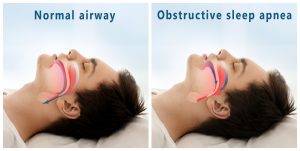
Every night, millions of people miss out on countless hours of sleep because of sleep apnea; and sadly, many more cases go completely undiagnosed! But your sleep isn’t all that’s at stake if you’re dealing with this condition, and you’re at an increased risk for numerous other health issues if things are left to progress. But did you know that among the various factors that contribute to sleep apnea, some of them are linked with your genes? Here’s more from your sleep dentist about this connection along with some ways that you can lower your risk.
(more…)


 If you have obstructive sleep apnea (OSA), you understand the importance of getting a good night’s rest. A CPAP or
If you have obstructive sleep apnea (OSA), you understand the importance of getting a good night’s rest. A CPAP or 
 Did you know obstructive sleep apnea (OSA) is more than just snoring? It’s a symptom of a serious breathing disorder. OSA is a condition that causes frequent disturbances in breathing from an obstruction in the upper airway. The soft tissues in the back of the mouth or throat collapse when sleeping. The narrowed air passage causes loud vibrations when air passes over the tissues, resulting in loud, chronic snoring. Unfortunately, that’s not the only concern. Your body is deprived of oxygen every time you stop breathing. You can develop several life-threatening issues without any treatment. Here are 5 dangers of OSA you can avoid with
Did you know obstructive sleep apnea (OSA) is more than just snoring? It’s a symptom of a serious breathing disorder. OSA is a condition that causes frequent disturbances in breathing from an obstruction in the upper airway. The soft tissues in the back of the mouth or throat collapse when sleeping. The narrowed air passage causes loud vibrations when air passes over the tissues, resulting in loud, chronic snoring. Unfortunately, that’s not the only concern. Your body is deprived of oxygen every time you stop breathing. You can develop several life-threatening issues without any treatment. Here are 5 dangers of OSA you can avoid with  If you have noticed more people are being diagnosed with sleep apnea, you aren’t imagining things. Research has found that 100 million people around the world suffer from sleep apnea; however, it is believed that 80% of cases haven’t been diagnosed. Data published by the American Journal of Epidemiology has found that rates of obstructive sleep apnea (OSA) cases have steadily increased over the past 2 decades, but what’s behind the spike in diagnoses? Here’s what you need to know about the rising cases of OSA and what you can do to safeguard your health.
If you have noticed more people are being diagnosed with sleep apnea, you aren’t imagining things. Research has found that 100 million people around the world suffer from sleep apnea; however, it is believed that 80% of cases haven’t been diagnosed. Data published by the American Journal of Epidemiology has found that rates of obstructive sleep apnea (OSA) cases have steadily increased over the past 2 decades, but what’s behind the spike in diagnoses? Here’s what you need to know about the rising cases of OSA and what you can do to safeguard your health.
 Whether you’ve recently been diagnosed with sleep apnea or you’re ready to cut ties with your CPAP, an oral appliance is a great solution. The custom-fit device repositions the lower jaw forward to keep the airway open. When used nightly, it’s an effective method of treating mild-to-moderate cases of sleep apnea; however, it’s going to take time to adjust to wearing it. Don’t give up after a few nights. Here’s what you need to know to make the transition easier.
Whether you’ve recently been diagnosed with sleep apnea or you’re ready to cut ties with your CPAP, an oral appliance is a great solution. The custom-fit device repositions the lower jaw forward to keep the airway open. When used nightly, it’s an effective method of treating mild-to-moderate cases of sleep apnea; however, it’s going to take time to adjust to wearing it. Don’t give up after a few nights. Here’s what you need to know to make the transition easier.